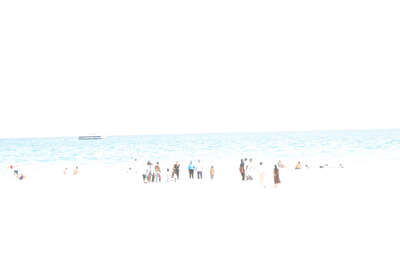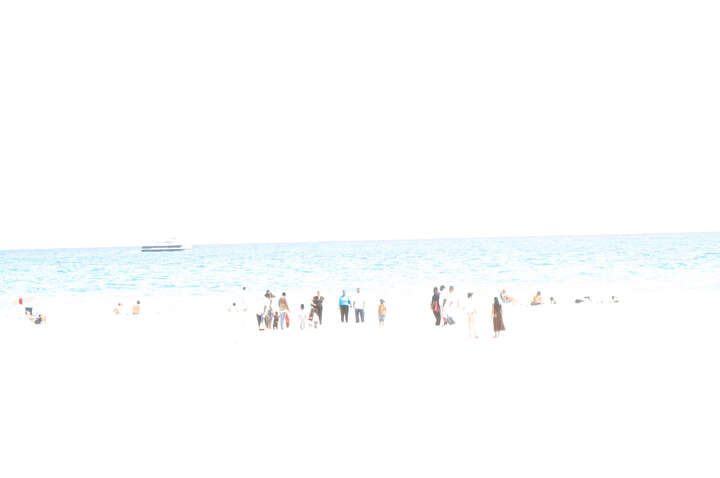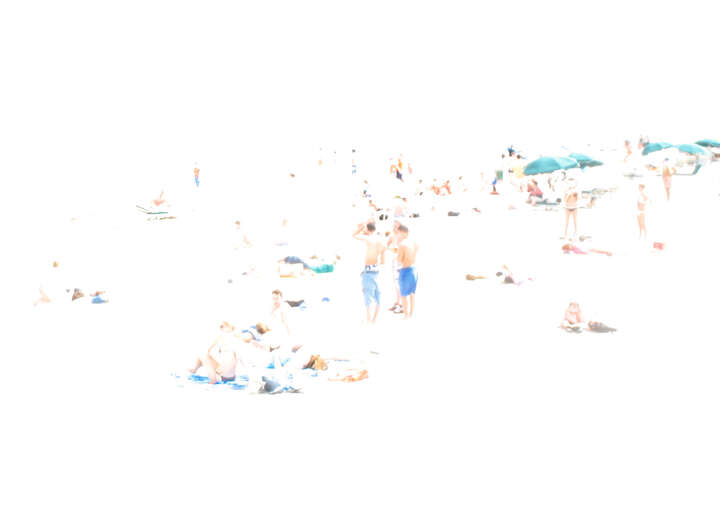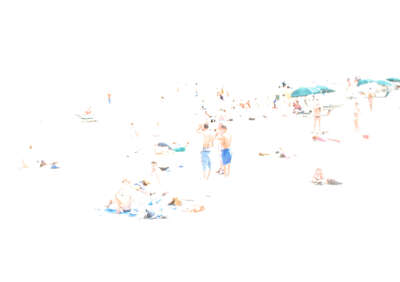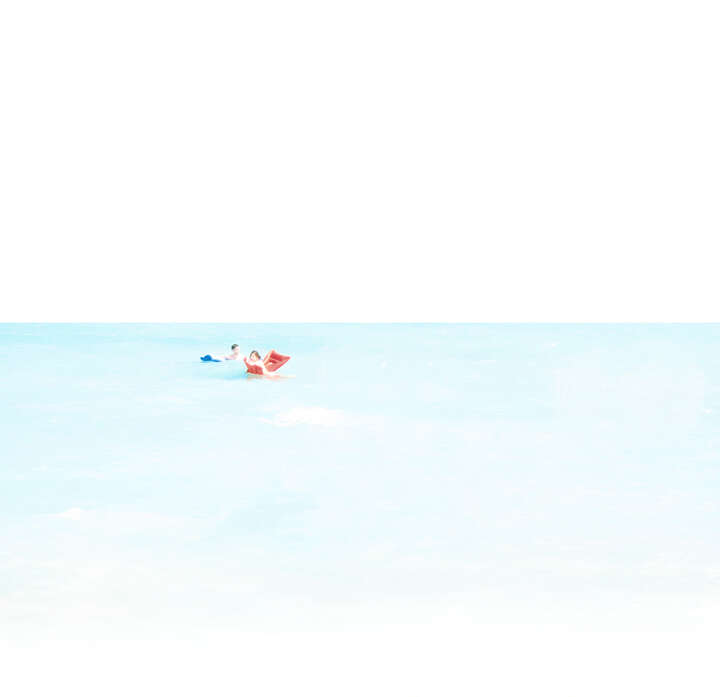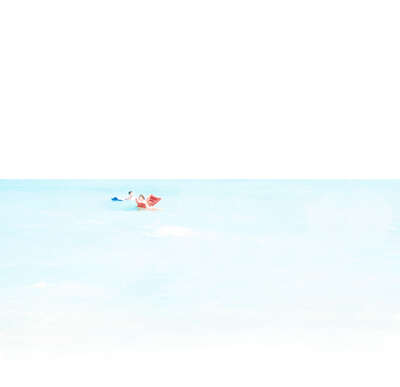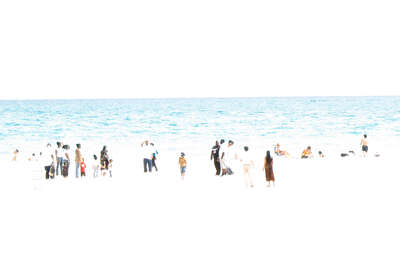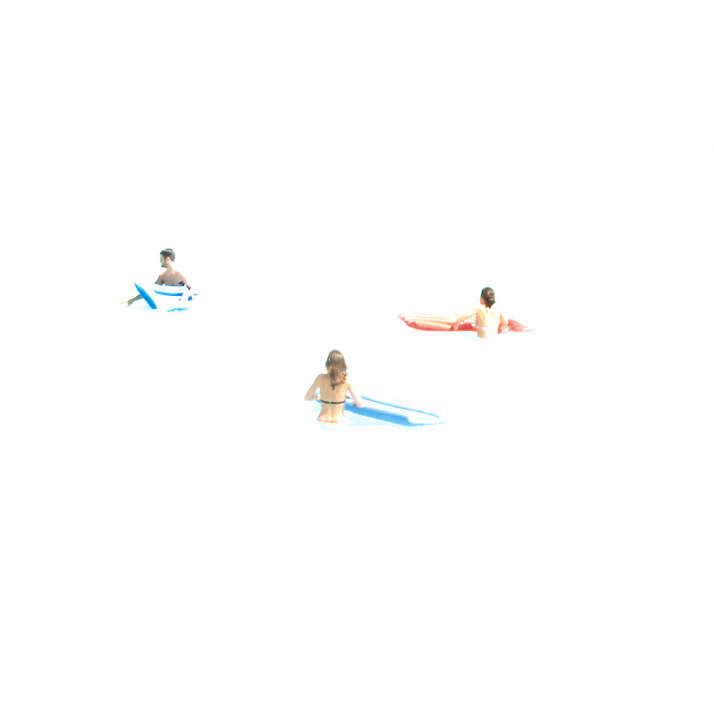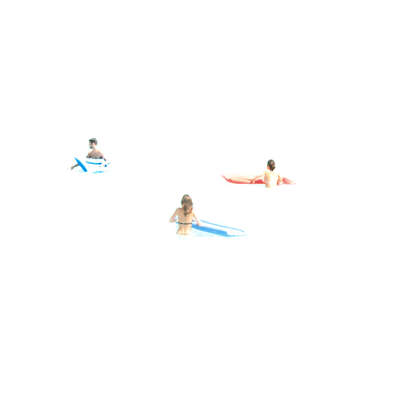Introduction
How does a street determine where a person should go? Can I recognize from the constellations of a group of people how close the individuals are to each other? How can I, by erasing the details of a context, gain access to a purely associative space? How can I achieve the development of “complete” pictures in spite of this omission and elimination of place-specific and social information, and in spite of overexposing the pictures? With her photographs of bright cities, constellations of people and situations from the series “From Monday to Sunday,” Berlin artist Ricoh Gerbl presents us with minimalist views in which “light itself” seems to paint and where her vocabulary of visual signs is reduced to the absolute minimum necessary.
Couples, passersby
At first glance, Ricoh Gerbl's new work suggests its title - describing what is in sight. But what is seen and what has been seen belong in two different categories. Simply put, a differentiation can be made between the act of perception and the memory of this act. However, the difference only exists by default, because what we see is being stored in the form of a mental image. Something entirely different occurs when standing in front of Ricoh Gerbl’s photographs, though. From the onlooker’s perspective, the figures seemingly dissolve into the image – as if it actually were a memory. But the memory is two-pronged: one direction represents dissolution, and the other composition. We remember only because we want to remember. This duality of perception is evident when confronted with Gerbl’s photographs, as what we see emerges from the canvas. What is recognizable but not immediately apparent is clarified linguistically through text. For instance, the fine lines on the street are not a feature of the street, but instead shadows cast by a fence. Couples sit atop the barrier, allowing the viewer to put everything into context. Alongside this dissolution is composition - which can occur on the image’s surface to counteract the fragmentation. At the same time, composition emerges in the eye of the beholder. He or she does not approach perception with empty eyes, but instead references previous encounters to interpret new observations. In this way, every new sight is also a recognition of the past. This recognition is clarified through the work’s title. It refers to a play written by Botho Strauss – and Ricoh Gerbl’s photos are reminiscent of stage sets seen at Berlin Theater productions of Strauss’ works. Gerbl supplements her images with short texts. “She takes what is perceived as a backdrop to set the stage…” Image and text, at first independent, become intertwined to communicate with the audience: hold on or flee. Anything is possible – including both composition and dissolution – within the theater setting, much like in Ricoh Gerbl’s photographs.
Bio
| 1990-1997 | Work contract for photography, Senate of Berlin, social support for artists |
| 1993 | Work stipend for literature, Senate of Berlin, artist program |
| 1996 | Work stipend for fine arts, Senate of Berlin |
| 2004 | Residency grant for literature, Salzwedel |
| lives and works in Berlin |
| |
Publications
Fast. Eine Regung plus Pfropfung. Mulitple. Kaltleimbindung, 2019
Theater der Zeit, 2013
SCORES 11/13, Vienna, 2013
Kunstforum, Vol. 204 October – November 2010
Leben im Luxus, Erzählungen, Mitteldeutscher Verlag, Halle, 2009
H.O.W., Art and Literatury Journal, New York, 2009
von hundert, Thomas Wulffen, “Thank you for judging”, 2009
von hundert, Barbara Buchmaier, “Gespräch mit Ricoh Gerbl”, 2008
Eikon #54, “Photographs for a Project by Eve Sussman”, 2007
Art in America, “Photographs for a Project by Eve Sussman”, 2007
Flash Art, Vol XXXIX No. 246, “Photographs for a Project by Eve Sussman”, 2006
Kind of, maybe, probably not, in: Bus Obscura / Road To Bath / How Beautiful Is the Truning Cabbage, 2006
Camera Austria, Issue 74, 2001
Camera Austria, Issue 64, 1998
Exhibitions
Solo Exhibitions
| 2021 | Lesungsverlosungsaktion, Lobe Block Terrrassenhaus, Berlin, Germany |
| 2019 | It’s Your Turn, Zentrum für aktuelle Kunst, Zitadelle Spandau, Berlin, Germany |
| 2008 | Thank you for judging, Berlin Museum of Medical History at the Charité, Berlin, Germany |
| 2007 | Mittwoch, Visite ma tante, Berlin, Germany |
| 2004 | The Mother and Apartmentgrafting, Smack Mellon, New York City, United States
Expressgrafting, in four apartments, New York City, United States
|
| 2000 | Kimmst amoi wieda zu mia, Künstlerhaus Bethanien, Berlin, Germany |
| 1999 | Die Wohnungspfropfungen, in eight apartments, Berlin, Germany |
| 1998 | Die Wohnungspropfungen, in four apartments, Berlin, Germany |
| 1997 | Verharren in Zwischenstopps, Annelies Diltschev, Berlin, Germany |
| 1986 | Ich muss mich nur noch fertig machen, dann bin ich fertig, Die der Art guten
Freunde, Berlin, Germany
|
Group Exhibitions
| 2022 | Die Auswilderung wird verschoben, Projektraum Verein der Berliner Künstlerinnen 1867, Berlin, Germany |
| 2021 | RaumSchau, Goldwerk Gallery, Rostock, Germany |
| 2020 | POP UP SHOW, Haus Kunst Mitte, Berlin, Germany |
| 2017 | Fortsetzung jetzt, 150 Jahre Verein der Berliner Künstlerinnen, Projektraum Alte Feuerwache, Berlin, Germany |
| 2013 | Ausstellung zum Marianne Werfekin-Preis, Pankow Gallery, Berlin and Spinnerei, Leipzig, Germany |
| 2008 | Existence in a Letter, Cluster, Berlin, Germany |
| 2006 | von der Angst, Kunstverein Tiergarten, Berlin, Germany
Inselglück, Galerie Nord, Berlin, Germany
|
| 2005 | ZBO – Subduktive Massnahmen - 1500 Jahre Sonderschutz für 50 Kunstwerke, Zentraler Bergungsort Oberried / Breisgau, Bundeskunsthalle Bonn, Bonn, Germany
Goldenes Zeitalter, Galerie Nord, Berlin, Germany
|
| 2002 | Gehag Forum, Berlin, Germany |
| 2001 | Familienbild, neue Gesellschaft für bildende Kunst, Berlin, Germany |
